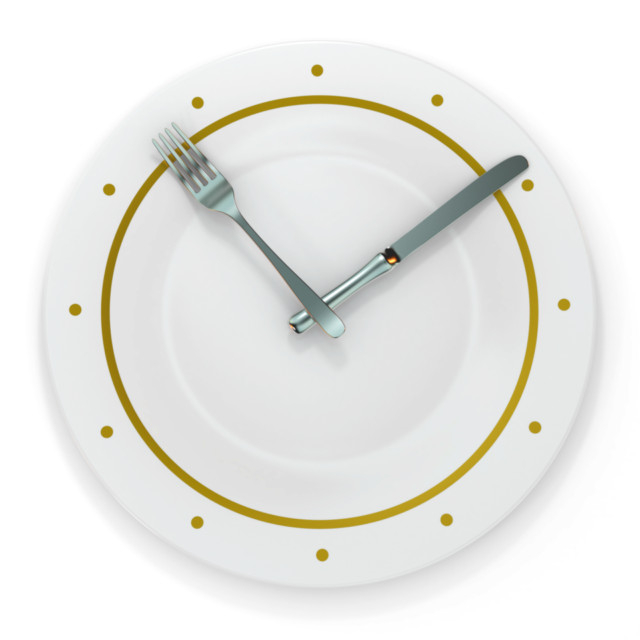
Neglecting to eat on time has become a daily ritual for most people these days. It has become a part of their lifestyle. Older generations, who valued their health and the logic of the body, made sure their meal times were like clockwork. “Breakfast was early in the day, dinner at midday and supper not long before you went to bed,” says Lubna Surya, nutritionist, Aster Medical Centre, Dubai.
“In the hustle and bustle of our daily lives and handling busy schedules, eating today has become of secondary importance,” she says. “People do not realise that eating regularly and on time is as essential as our work. All work and no proper food will have a bad outcome.”
She has a word of advice that is true but invariably ignored by most people: “You eat to live, not live to eat.”
There are other advantages also when you eat at regular times. “You keep your blood sugar levels stable. How does this help? It prevents hunger cravings, which could result in over-eating,” says Lubna. “These are the moments when you usually reach out for a chocolate bar, latte or a muffin”
Missing meals often results in longing for high-energy foods, and the consequent food choices are often made based on their handiness. “Junk food, fast food, anything that is in a packet... tese foods increase the risks of various diseases.”
People who eat on time also tend to have a lower calorie intake compared to those who eat irregularly. “This is crucial if you are looking to maintain or lose weight.”
Apart from eating on time, it is necessary to eat more smaller meals through the day rather than three large meals. This keeps the body busy burning calories and helps in weight management.
Here are Lubna’s tips on how you should eat breakfast, lunch and dinner
1) Breakfast: why should we eat breakfast like a king?
You often hear that breakfast is the most important meal of the day. Eating a healthy, balanced breakfast is the best way to jump-start your day. Your body fasts for eight hours while you are sleeping. A breakfast gets your brain and body moving by having that first meal of the day.
Eating breakfast will reduce your hunger later in the day so you are less likely to overeat at lunch or dinner
If you and your children regularly skip breakfast to save time, calories, or getting a few more minutes of sleep, remember that eating a wholesome, nutritious morning meal will probably save you time in the long run.
By recharging the brain and body, you’ll be more efficient in mostly everything you do.
Studies show that children who skip breakfast are tardy and absent from school more often than children who eat breakfast on a regular basis.
Preparing a good breakfast can be as quick and easy as splashing some milk over cereal.
If you still can’t have breakfast at home, pack a breakfast bag or smoothie the night before that can be eaten on the way to school and work.
Some people skip breakfast in an effort to lose weight, but that is more likely to cause weight gain than weight loss. Skipping breakfast is strongly linked to the development of obesity. Studies show that overweight and obese children, adolescents, and adults are less likely to break the fast each morning than their thinner counterparts.
Research also shows that people who skip breakfast tend to eat more food than usual at the next meal or nibble on high-calorie snacks to stave off hunger.
Several studies suggest that people tend to accumulate more body fat when they eat fewer, larger meals than when they eat the same number of calories in smaller, more frequent meals.
Teens, especially teenage girls, believe skipping breakfast is a perfectly logical way to cut down on calories and lose weight. But parents need to teach them the the importance of the morning meal and the role it plays in maintaining good health and preventing obesity.
What are the best breakfast options?
Breakfast is a time when we signal to the body that the fast from the night before has ended and that we need to shift into different biology. This meal is critically important to help jump-start our metabolism first thing in the morning, preventing excessive hunger and overeating later in the day.
That doesn’t mean that we have to make a full course sit-down meal. Even an apple and a piece of cheese walking to school can be enough.
Breakfast needs to be balanced and of good quality, so a bowl of highly sugared, highly processed breakfast cereal is really not the way to go. There are a number of less processed, wholegrain, high-fiber breakfast cereals that are available.
Ideally, a serving of breakfast cereal should have at least 4gms of fiber. Oatmeal is also good in the morning. To make it yummy, toss in toasted almonds and dried fruit.
2) Lunch: Why should we eat lunch like a prince?
Lunch is for productive people who want to benefit from taking 20 minutes out to relax and refuel.
The rise in blood sugar following the meal aids concentration and brainpower. A dip in blood sugar (such as the afternoon ‘slump’) that can arise from a skipped meal can cause tiredness, mood changes and loss of concentration. It is not the most ‘productive’ state to be in.
Eating a healthy lunch is important for so many reasons:
1) Food gives us our energy. Eating a nutrient-packed lunch helps us avoid a mid-afternoon crash.
2) Skipping lunch leaves us starving by the time we get home from work or running errands. This leads to binge eating or the temptation to eat fast food
3) Taking time out of your busy day to eat lunch with a friend or co-worker helps you refresh and relationship-build, two things that are great for our spirits.
What should you eat for lunch?
Basically it should be food that gives you the nutrition you need.
The key to healthy lunches lies in two components: simplicity and the lunch box. Stock up on simple, nutritious ingredients and pack your lunch the day before.
By making your own meals, you are more likely to stick with your meal plan. Not eating out will save you calories as prepared foods are often loaded with extra preservatives and sauces that add up quickly.
3) Dinner: Why should we eat dinner like a pauper?
There is much importance placed on meal-times; breakfast with its ability to kick-start the day and lunch as an opportunity to take a break to re-fuel and re-focus the mind. Dinner is just as important as it has a number of essential functions.
Since it’s the last meal of the day it’s important to make the right choices because you won’t eat again for at least another 10 hours or so.
Ensuring that there is a steady supply of glucose for the body to use as fuel for essential processes whilst we sleep is critical.
A common cause of waking in the night, often seen in insomnia, is when levels of sugar in the blood fall. The body then has to release stored glucose and this action can cause you to wake and sometimes it may be difficult to get back to sleep.
As well as eating to balance blood sugars, we also need to eat correctly to get the right amino acids. These are part of the building blocks of the body, they also work as neuro-transmitters, transporting messages around the nervous system, and they play an essential role in promoting well-being and mood.
One such example is serotonin. Deficiency is associated with mood disturbance, sleep problems and aggressive and compulsive behavior. We avail of serotonin after it has been converted in the body from eating foods which contain the amino acid tryptophan. It’s worth remembering that tryptophan is carried into the brain via carbohydrate - another reason to have your protein and carbs dinner. Good sources of tryptophan include: chicken, turkey, tuna (fresh rather than tinned), soya beans, nuts, seeds and bananas.
Dinner also offers an opportunity for the family to eat together. In the UK as an example, statistics show that not all families are eating together and many teenagers eat in their rooms or before their parents. This encourages not only poor eating habits and choices but it also means that parents and children don’t really get a chance to talk to each other.
A study by Harvard researchers also found that families who eat together every day were also eating a better range of important nutrients such as calcium, fiber, iron, vitamins b6 and b12 and vitamins C and E.
Dinner tips to remember:
1) Don’t eat too late in the evening – the longer you wait to eat, the more likely you are to overeat as you may be more hungry.
2) Avoid too many stimulants with your dinner - alcohol, caffeine (coke, coffee, tea, chocolate) as these can prevent you from getting to sleep. If you are sensitive to stimulants, leave at least six hours between drinking/eating them and sleeping.
3) Avoid fatty foods late at night – it’s harder to digest and break these down and may lead to poor quality sleep, especially if you suffer from indigestion.
4) Eat slowly and relax. When we are stressed, the body can’t digest nutrients properly, so take time to chew. It takes about 20 minutes for the body to register that we are full so by slowing our eating we are less likely to eat too much
What should we eat for dinner?
It is essential to eat a good dinner that has protein, meat, eggs, lentils or beans.
Dinner should also contain carbohydrates, such as potatoes, pasta, rice, vegetables and fruit.
The combination of these which will ensure a steady release of glucose to the bloodstream and will give you a restful sleep.














